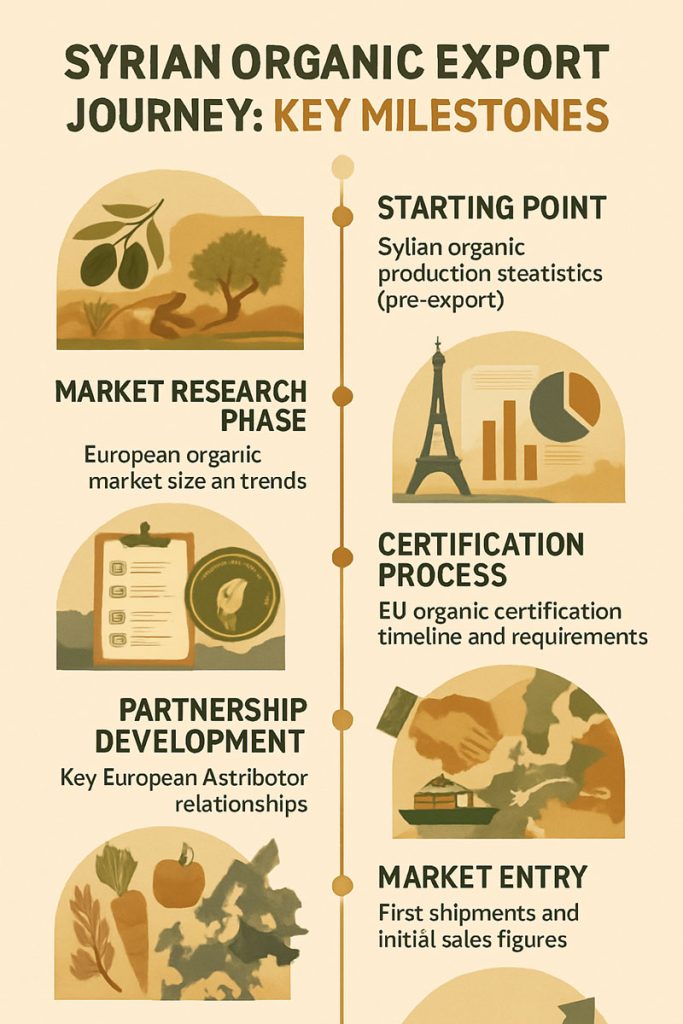In the ever-changing world of international trade, success stories emerge that transcend challenges and open new horizons. This is an inspiring case study about how Syrian organic producers managed to penetrate European markets, transform challenges into opportunities, and deliver high-quality products that meet the stringent standards of the European market. This study targets ambitious Syrian exporters seeking to expand into Europe, and European importers searching for distinctive organic products. As a trader with deep expertise in Middle Eastern agriculture and European organic markets, I will provide a comprehensive analysis of this journey, focusing on the practical aspects and strategies that led to this success.
Starting Point: Organic Agriculture Potential in Syria

Syria has long enjoyed tremendous agricultural potential, thanks to its fertile soil and diverse climate. Before 2011, agriculture formed a significant part of the Syrian economy, and the country enjoyed self-sufficiency in many crops. Although specific data on organic production before this period may be limited, there are strong indicators of the existence of natural and traditional farming practices that align with organic agriculture principles. For example, Syria ranked second globally after India in organic cotton fiber production for the 2009-2010 season. This indicates a strong foundation and untapped potential for transitioning toward organic agriculture on a broader scale.
Syrian agriculture is characterized by numerous crops that can be organic by nature, such as olives and Aleppo pistachios, which rely heavily on rain-fed agriculture. There is also growing interest in transitioning toward organic agriculture in Syria to address food security challenges and reduce dependence on chemical pesticides and fertilizers. This trend reflects increasing awareness of the long-term benefits of organic agriculture, both environmentally and economically.
Understanding the European Organic Market
Europe is one of the largest and fastest-growing markets for organic products in the world. The European organic food and beverage market is estimated at \$141.29 billion USD in 2024, and is expected to reach \$273.85 billion USD by 2029. In 2023, Europe captured a market share of 44.17% of the global organic food market. This continued growth reflects increasing awareness among European consumers about health and sustainability, and their desire to obtain natural products free from chemicals.
The European organic market is characterized by diversity, encompassing a wide range of products, from fresh fruits and vegetables to processed products such as dairy, meat, and grains. There is growing demand for imported organic products, especially those coming from regions with good reputations in natural agriculture. This represents a golden opportunity for Syrian producers who can offer unique, high-quality products that meet these requirements.
European Organic Certification Process: Key to Entry
To enter the European organic market, products imported from outside the European Union must obtain a control certificate issued by the European Union. This process requires adherence to strict standards and goes through several stages:
- Application Submission: The process begins with the producing company submitting an application to an accredited certification body. The application must include detailed information about the farm or facility, crops grown, and agricultural practices followed.
- Eligibility Determination: The certification body reviews the application to determine whether the operation is eligible for certification according to European standards.
- On-site Audit: A comprehensive on-site audit is conducted to assess agricultural practices, quality management systems, and production records. Auditors ensure that all production stages, from seeds to harvest, comply with European organic regulations.
- Certificate of Inspection (COI) Issuance: After successfully passing the audit, a Certificate of Inspection (COI) is issued to exporters. This certificate is necessary to allow organic products to enter the European market.
This process requires strong commitment to quality and transparency, and represents a necessary investment for Syrian producers who wish to compete in the European market. Although the process may seem complex, there are organizations and experts who can provide support and assistance in successfully navigating these stages.
Building Partnerships: Bridge to Europe
Building strong relationships with European distributors is critically important for the success of Syrian organic products in the European market. Syrian producers must seek partners who have experience in distributing organic products, an extensive customer network, and deep understanding of the local market. Partnership building strategies can include:
- Participation in Trade Fairs: International trade fairs, such as BioFach in Germany, are excellent opportunities to meet potential distributors and showcase products.
- Direct Outreach: Producers can communicate directly with potential importers and distributors via email or phone, and provide samples of their products.
- Leveraging Chambers of Commerce: Chambers of commerce and industry can provide valuable information about European markets and help establish connections with potential partners.
- Collaboration with NGOs: Some non-governmental organizations work to support producers in developing countries and facilitate their access to global markets.
Partnerships should focus on building trust and long-term cooperation, as the European organic market values sustainable and reliable relationships.
Market Entry: Initial Shipments and Early Sales
After obtaining necessary certifications and building partnerships, the market entry phase begins. This phase includes initial shipments of Syrian organic products to Europe and early sales. Although specific data about shipments and early sales for Syrian producers is not available in this study, it can be inferred that success in this phase depends on several factors:
- Product Quality: Products must be of high quality and meet European consumer expectations.
- Packaging: Packaging must be attractive and practical, reflecting the organic nature of the product.
- Marketing and Promotion: Producers and distributors must work together to effectively market products, highlighting their unique story and organic quality.
- Competitive Pricing: Prices must be competitive with other organic products in the European market, taking into account additional costs associated with certifications and shipping.
Shipments can start with small quantities to test the market and gather consumer feedback, then gradually expand based on achieved success.
Growth Phase: Expanding Product Lines and Market Coverage
Once initial success is achieved, Syrian producers can move to the growth phase, which includes expanding product lines and market coverage. This can include:
- Product Range Expansion: Adding new organic products to the portfolio, such as dried fruits, jams, oils, or herbs.
- Production Increase: Investing in infrastructure and resources to increase production quantities to meet growing demand.
- Entering New Markets: Expanding into other European countries, or targeting new consumer segments.
- Brand Investment: Building a strong brand that reflects the values of Syrian organic products and their rich history.
This phase requires careful planning and continuous investment, but offers tremendous opportunities for growth and profitability.
Current Success: Performance Metrics and Achievements
Despite the challenges Syria has faced in recent years, the success story of organic producers in conquering European markets is a testament to their resilience and determination. Current performance metrics and achievements can include:
- Increased Export Volume: Continuous growth in quantities of organic products exported to Europe.
- Expanded Customer Base: Attracting more European importers and distributors.
- Brand Recognition: Building a strong reputation for Syrian organic products in the European market.
- Social and Economic Impact: Providing employment opportunities, supporting local communities, and contributing to sustainable development in Syria.
These achievements not only reflect commercial success, but also highlight the role that organic agriculture can play in promoting economic and social development in Syria.
Conclusion
The success story of Syrian organic producers in reaching European markets is an inspiring tale of perseverance, innovation, and quality. Through deep market understanding, commitment to international standards, and building strong partnerships, these producers managed to overcome challenges and achieve remarkable success. This story is not merely commercial success, but also testimony to the tremendous potential of organic agriculture in Syria, and its ability to contribute to economic and social development, while providing healthy and sustainable products to consumers worldwide.



